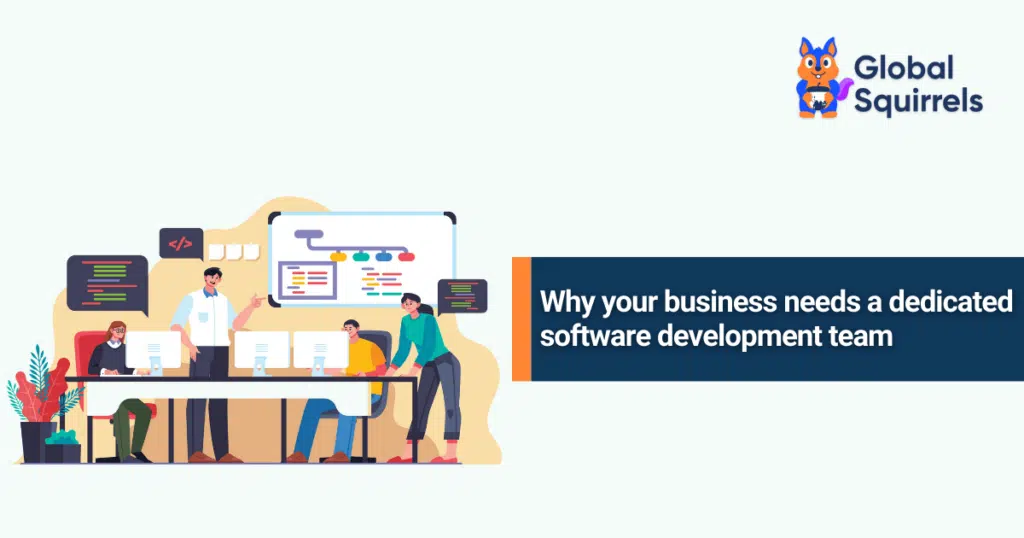Why your business needs a dedicated software development team

A well-designed software/product is crucial for SaaS-based tech ventures to attract and retain customers, regardless of their size or industry. To stay competitive, businesses need to leverage technology to streamline operations, improve customer experience, and drive growth.
A dedicated software development team can make the difference between unlocking your business potential. Hiring skilled software developers can bring your innovative ideas to life. You can create custom software solutions and gain a major competitive advantage.
In this blog, we will cover the benefits of hiring a dedicated software development team and the core roles within such a team. If you are hiring these professionals remotely, we will also highlight some hurdles of offshore hiring. Additionally, we will talk about how Global Squirrels can assist you in effortlessly establishing and managing an effective remote software development team.
What is an ideal software development team structure?
In modern software development, it is very important to have effective team structures that promote collaboration and efficiency. You can hire dedicated development teams as they can feature several specialized roles to make projects successful. Below is a brief intro to key roles in a software development team: DevOps engineers, software engineers, QA engineers, and business analysts.
1. DevOps engineers
Role and responsibilities:
Hiring DevOps engineers bridges the gap between development and operations by automating processes, promoting collaboration, and enabling IT to deliver products and services faster for customers.
- Continuous Integration/Continuous Delivery (CI/CD): They streamline the code deployment processes through CI/CD pipelines.
- Collaboration: Closely working with both developers and the operations team to have a smooth code transition from development to production.
- Monitoring and security: System performance oversees and embeds security practices into the development lifecycle.
2. Software engineers
Role and responsibilities:
For the most part, hiring software engineers to write code to create applications or systems can help your business immensely.
- Software development: Writing software applications by designing, coding, testing, and maintaining.
- Problem-solving: Analyzing user needs and developing software solutions that meet those requirements.
- Collaboration with other teams: Ensuring that applications are tested thoroughly before deployment with QA engineers.
Look for skills such as programming languages (Java, C++, JavaScript), knowledge of algorithms and data structures, and awareness of software development methodologies (e.g., Agile).
3. QA engineers
Role and responsibilities:
Hiring Quality Assurance (QA) engineers helps keep focus on ensuring that the quality of the software is maintained through systematic testing.
- Testing: Creating test plans and test cases and executing any type of testing, manual and automated.
- Bug identification: Bug identification is about catching bugs and issues in the software before it goes live.
- Collaboration with developers: Helping developers improve by providing feedback to developers on issues found during testing.
Skills required:
Ideally, they must have good experience with testing methodologies, experience with automation tools (like Selenium), and analytical skills to identify what could be a problem with the software.
4. Business analysts
Role and responsibilities:
Hiring Business analysts can be helpful as they are the link between the stakeholders and the development team.
- Requirement gathering: Requirements are elicited from stakeholders to ensure that the development team knows what it should build.
- Documentation: Write out the details of project specifications in an extensive documentation.
- Stakeholder communication: Provide communication between technical teams and non-technical stakeholders to align on project goals.
Core skills:
To translate business needs into technical requirements, business analysts need strong analytical skills, superb communication skills, and a strong understanding of business processes.
5. Software developer
Role and responsibilities:
Any development team relies heavily on hiring software developers to create applications and systems to meet user needs.
- Application development: They write, test, and maintain codes for Software applications.
- Feature implementation: Working closely with business analysts and product owners to deliver new features according to user needs.
- Troubleshooting: Resolving bugs and performance-related issues in already-built applications.
Skills required:
It is important for software developers to have strong programming skills (e.g., in Java, Python, C#, etc.), know how to design software, and be acquainted with version control systems (e.g., Git). There are also essential skills such as strong problem-solving skills and the ability to work in a team.
Challenges you may face when you hire remote software development teams directly
Setting up a local entity
Setting up an entity for remote software development teams is difficult and time-and-cost-consuming. The business model needs to be clearly defined, local labor and tax laws need to be navigated, and tons of legal documentation has to be completed. Building the required IT infrastructure, ensuring data security, recruiting skilled talent and building the clear processes of management are other challenges.
Learn more: Employer of Record vs. Entity Setup: Which One is Better for Your Business?
Legal complications
When you are hiring remote developers, there are challenges navigating through the complex legal issues, such as tax implications, employment contracts, and compliance with local labor laws, to name a few.
Onboarding difficulties
Remote onboarding lack the personal touch of in-office training, and it is harder for new employees to get to know the workflows and team dynamics. It can also create lower productivity initially as new hires try to figure out what they should do.
Cost considerations
Hiring remote developers may sometimes lower your recruitment costs, but unexpected expenses related to recruitment, onboarding, and management expenses can add up. Moreover, turnover rates may be higher in remote locations, leading to additional re-hiring costs.
Time zone differences
One of the most significant hurdles is coordinating across different time zones. This creates scheduling conflicts, delayed responses, and poor collaboration, and it is tough to keep up with real-time communication and project momentum.
How does our EOR help you hire top software development teams remotely?
Are you struggling with the challenges mentioned above? Well, this is where Global Squirrels comes into the picture. Our SaaS (Software-as-a-Service) platform is a staffing and payrolling platform that will ease the way you hire dedicated software development teams by eliminating all your challenges:
- With our EOR solution, there is no need to set up an entity. This is because our platform acts as the legal employer of the hired talent in the country of your choice.
- Our platform ensures you face no legal risks by adhering to local and international labor laws. This is done by prioritizing important laws, analyzing, and consistently self-updating with new labor and tax laws. For instance, if you are hiring from the Philippines, our platform ensures that the W-8 BEN form is obtained from your hired talent to avoid any legal consequences.
- Global Squirrels streamlines the onboarding process by allowing you to interview potential employees. This ensures clear expectations and minimizes miscommunications.
- Hiring through our platform allows you to save up to 80% on hiring costs with the help of our transparent pricing model. In this pricing model, you just need to pay a platform fee and the payroll cost of the hired workers.
- Global squirrels solve the challenge of finding the talent that is open to work during you time zone. When you put in a job request, you can mention whether you want the employee to work during your time or with some overlap.
Our platform offers these solutions that match your requirements in pricing plans:
Our Purple plan helps you onboard all your already-sourced candidates while also managing administrative functions such as payroll & benefits management, task & timesheet management, compliance with local and international labor and tax laws, performance management, and offer letter generation.
The Orange plan is more comprehensive as our platform helps you find and hire dedicated software development teams individually who meet all your business requirements. Our platform will ask you to fill in some details, such as job description, position type, educational background, skills, and the countries you want to hire from. Within 2 to 5 days, our platform will share pre-screened and background-checked profiles with you on the portal. You can choose the ones you would like to interview and finally select the candidate you want to onboard. Our platform will then start the onboarding process and manage the HR functions mentioned above.
Are you ready to hire dedicated software development teams? Request a demo today!
